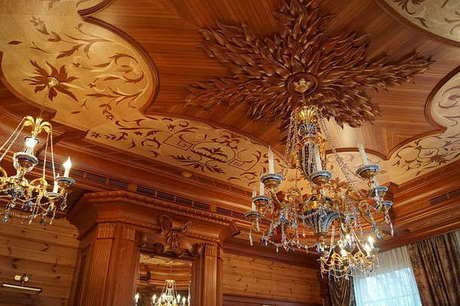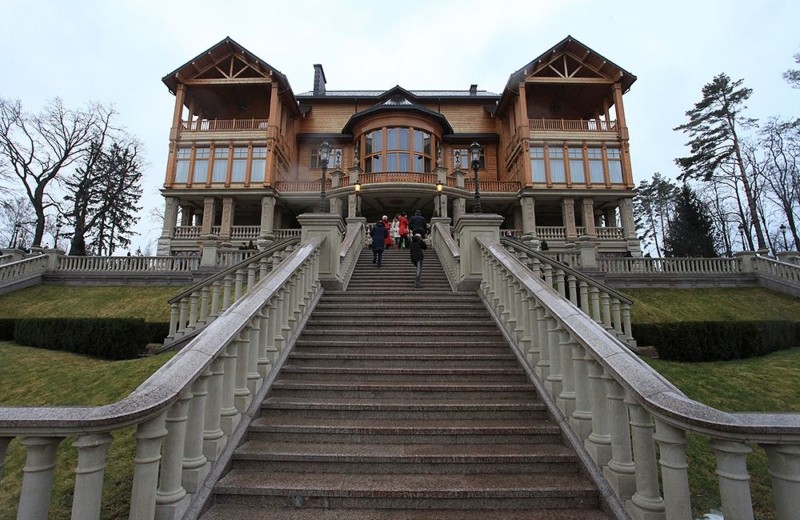Editor's Note: This is part of a series of investigative reports based on documents recovered from deposed President Viktor Yanukovych's Mezhyhirya estate after the Ukrainian leader abandoned the presidency on Feb. 21-22 and fled to Russia, where he is living in exile. The documents and stories are published by YanukovychLeaks.org website.
Former President Viktor Yanukovych's opulent residence only had one major contractor: a development company called AVK with an intriguing history.
Its real ownership was disguised behind a proxy, and the company’s purpose and operations were as murky as the waters of the lake into where the firm's files were unceremoniously dumped when Yanukovych fled Ukraine in late February.
The company spent like there was no tomorrow, and a lot of the cash went for things that had nothing to do with construction, such as for the luxurious whims of Yanukovych and his family. It ran its business as if it were immune to any prosecution or not answerable to any authority, as if the good times would last forever.
Vanity fair
The documents provide a glimpse of the monies lavished on Mezhyhirya.
In 2010-2011, the contractor sent multiple invoices to Tantalit, a real estate management and construction company that on paper was the formal owner of Mezhyhirya. The invoices were tied to numerous contracts and commissions that were given to the firm during the 140 hectare palatial estate’s development. An analysis of the invoices doesn’t reveal a logical procurement pattern. They ranged from procuring decorative woodwork to conducting media monitoring.
And the billing amounts were not small. When decorative woodwork was commissioned for the billiards room of the main residence, typically referred to as Honka, the bill was €1.6 million ($2.2 million). Wooden elements elsewhere in the house cost €2.7 million ($3.7 million). Tens of thousands of dollars were spent on bathroom accessories, making the facilities so over the top that they are commonly referred to as “the golden toilets.”

Money was lavished on the grounds as well. According to one contract, $312,000 was paid to improve the embankment. There are hundreds of similar contracts.
A few dozen other contracts involved much larger sums and more questionable expenditures, such as a media monitoring contract worth $5.3 million.
Natalya Ligachova, head of the nonprofit media watchdog Telekritika, says that even the most sophisticated type of monitoring of both regional and national media, employing top professionals, would not run over $20,000.
AVK’s cash source
As the main contractor, AVK received much of its money from Tantalit. But plenty came from other companies allied with the ex-president’s inner-circle, dubbed “the Family.” Millions were paid to AVK by Dom Lesnika and the charity foundation, Revival of Ukraine, for work simply described as “services provided according to contracts.”
The most interesting part of the income was identified in payment declarations such as, “infusions from investors,” including from Ukrbusinessbank, or UBB, which appeared frequently. In August of 2010, for example, AVK received $3.25 million from UBB.
According to Forbes Ukraine, Ukrbusinessbank is controlled by the ex-president’s elder son, Oleksandr Yanukovych who has had his assets frozen by the European Union and other countries.
In 2009, one of the shareholders of this bank was Eduard Prutnik, who was adviser to then-Prime Minister Yanukovych in 2002-2005, and his right-hand man. Until May 2010, the bank’s top manager was Serhiy Arbuzov, who then moved on to be National Bank governor and first deputy prime minister under President Yanukovych.
Vitaliy Shabunin, head of the Anticorruption Action Center, a watchdog agency, says that considering AVK’s statutory capital of $400,000, and the number and nature of its financial transactions, it’s pretty clear for what it was used.
“As we are talking about millions of hryvnias – this is (money) laundering, 100 percent,” he said. It is common when laundering money to issue contracts for work that cannot be easily traced such as vague business services.
The whims of a rich company
Other AVK expenses that have little relation to construction include $9.9 million that was paid to prepare the sale of what was referred to as a “culture and heath center.” A study of the market for medical equipment cost AVK a whopping $12 million. Another market analysis of public housing cost $5.6 million.
All these services were paid for in October-December 2010, less than a year after Yanukovych became president in February.
Some services were purchased more than once. For example, the public housing market study was commissioned three times on the same day from different companies, and the total costs were nearly $25 million.
The total expenditure in this three-month period was well over $125 million. Anti-corruption expert Shabunin says, “these transactions are a cash-out service, basically. Even just those certificates (salvaged from the lake)are enough to send (some officials) to prison for life.”
Many of the companies that received payments have already disappeared. Moreover, their official activities had nothing to do with the services they rendered to AVK.
For example, the three companies Belite Prim, Blumarine Bud and DESA LTD, founded in a short space of time in 2010 just weeks before receiving cash from AVK, have already ceased their business activities. The closure of at least one of them was handled by a company that also received money from AVK.
Another recipient, NS Bright LLC, was registered at a non-existent address. Yet another one, ARS – Alliance LLC, was actually a firm that recycled scrap metals. The general prosecutor’s office, which received the original documents, is investigating just how much money may have disappeared.
AVK and its clients
Officially, AVK received Mezhyhirya orders from Tantalit LLC, which was registered in the name of Sergiy Klyuyev, a Party of Regions’ member of parliament and the younger brother of Yanukovych’s former chief of staff.
Tantalit leased 129 of Mezhyhirya’s 140 hectares. Officially, the former president owned only 1.8 hectares. The rest of the property was owned by the charitable foundation, Revival of Ukraine.
The proxy owner for Tantalit in 2011-2012 was Pavlo Litovchenko, but the list of owners changed a number of times.
Ukraine’s Information Resource Center, a database of companies, lists Cherkasy resident Dmytro Sidlyarenko as the owner of AVK. The company closed down on March 15, 2012, but Sidlyarenko remains co-founder of two TVchannels, TRK Soyuz-TV LTD in Zhytomyr and TRK Rivne1 LTD in Rivne.
Officially AVK was registered in Kyiv, on 4 Zakhidny Lane. But actually this address corresponds to a branch of the state-owned Pension Fund in the Solomyanskiy district of the capital. “Nobody rents space here,” a surprised security guard says. “There are a lot of different companies around us. But their addresses are different. I have never heard about this company.”
Reporters found websites from the time with postings from a person with the same name as Sidlyarenko that used the same street address as well. In those sites, he posted a resume and announced he was looking for a job with “opportunities for career growth” and a salary of $900 per month. When reporters called the numbers, the person who answered the phone said they had no idea who Sidlyarenko is.
Before Sidlyarenko, the official owner of AVK was Vitaliy Sakhatskiy. Until recently, a man with that name had been working as head of the construction department of the state company that managed government-owned residences and other properties. He has not been seen at work for some time, though.
Maksym Opanasenko is a journalist for the Bureau of journalistic investigations Svidomo. This is an investigation by the Organized Crime and Corruption Reporting Project (OCCRP), which is based in Washington, D.C., a Kyiv Post partner.



